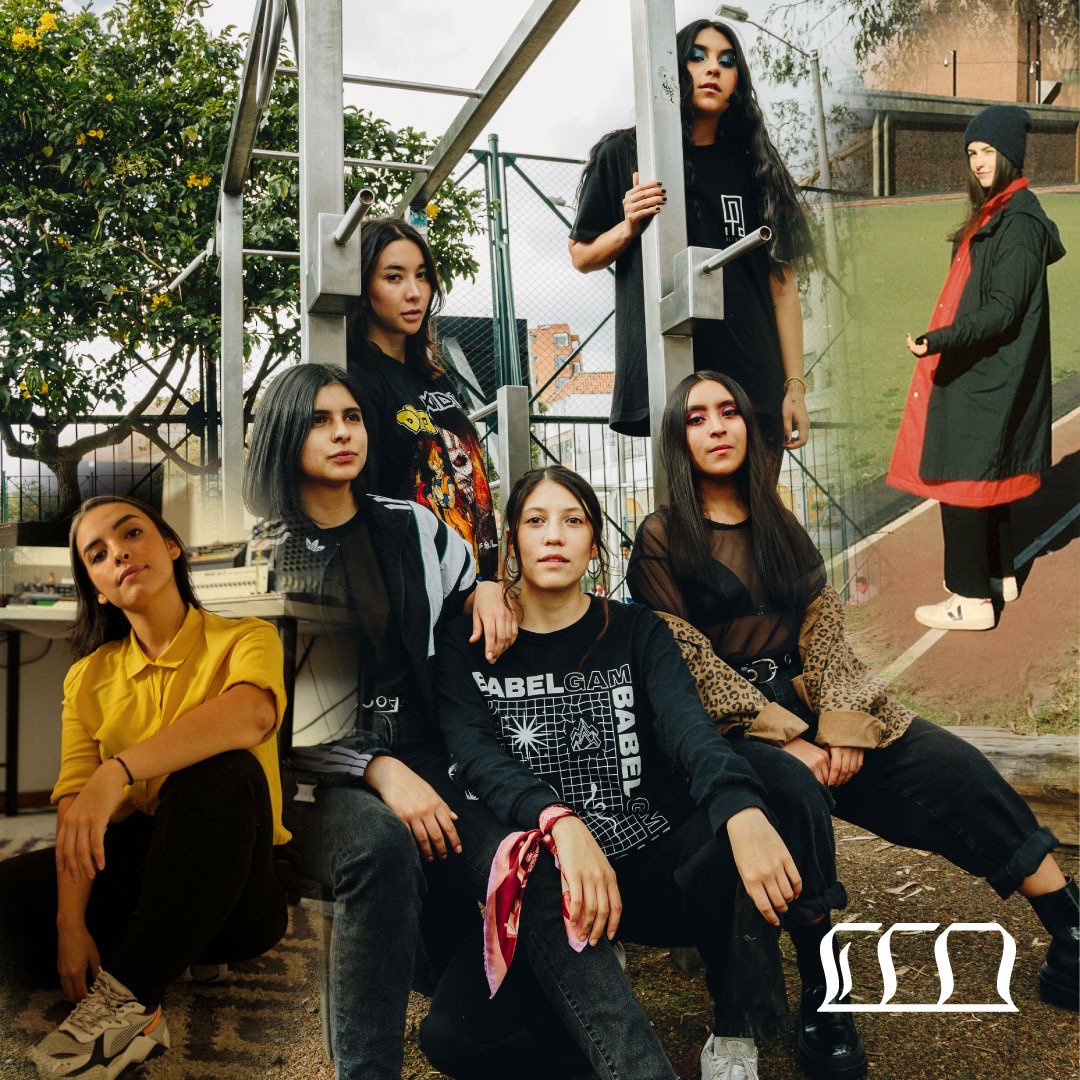Bitter Babe on Eco – Working towards an ethos of union around electronic communities in Latam.
WORKING TOWARDS AN ETHOS OF UNION AROUND ELECTRONIC COMMUNITIES IN LATAM
Interview by S(GBA), edited by Renata Iberia, November 2020

We tend to think of the dance floor as a place of forgetfulness. For many of us, nightlife has been a small space where we can relieve the tensions of day to day life, a lapse when apparently nothing matters because it’s only you and the beat. Because after all, what is electronic music if not the intimate and individual passage to a trance-like state, right?
Not really. I can assure with all safety that most of us have encountered some kind of unpleasant situation during parties — and if anyone claims they haven’t I urge them to open their eyes in between the strobe lights and the night’s excitement—. From the bouncer not so casually selecting who comes inside the club, men at the dance floor giving unsolicited advances, to all-male line ups and no visibility or monetary support for local talent. These, let’s be clear, are not isolated cases nor they are devoid of significance. Quite the contrary, they are a reflection of who we are as a society: whether we like it or not, the dance floor is a space permeated with politics and unresolved conflicts that we have to address now.
Born in Colombia this very year, ECO is a platform constituted by seven women opening up new territories for horizontal and meaningful discussions around our responsibility as an electronic music community. Self-defined as a group that looks for the “keys to self-management and interdependence of Colombian and Latin American electronic ecosystems,” ECO is posing new questions around sexism, racism, colonization and political resistance through panels and open vessels of communication with the community’s participants. We talked to ECO member and Colombian DJ Laura Solarte (working under the moniker Bitter Babe) about her perspective and goals for the platform. Along her, we explore the new ethos of union coming together inside Colombia and the Latin American electronic music sphere. Where to start with all the work that needs to be done? Solarte mentions a fundamental shift of narrative, to stop talking about scenes and start talking about communities. In her words, “ talking about a scene is very general and also abstract, like, what does that even mean? A community is something you build with people who think alike and have the same interests. It’s a place where are rules for basic understanding and that’s shaped around different views and actions of its agents. In a community, there are conversations and coherence with our actions.” It may seem minimal, but language is a fundamental basis in order to start conceptualizing actions towards change. Communities, as Solarte mentions, are spaces where we recognize each other as participants working together towards a common goal.
Not really. I can assure with all safety that most of us have encountered some kind of unpleasant situation during parties — and if anyone claims they haven’t I urge them to open their eyes in between the strobe lights and the night’s excitement—. From the bouncer not so casually selecting who comes inside the club, men at the dance floor giving unsolicited advances, to all-male line ups and no visibility or monetary support for local talent. These, let’s be clear, are not isolated cases nor they are devoid of significance. Quite the contrary, they are a reflection of who we are as a society: whether we like it or not, the dance floor is a space permeated with politics and unresolved conflicts that we have to address now.
Born in Colombia this very year, ECO is a platform constituted by seven women opening up new territories for horizontal and meaningful discussions around our responsibility as an electronic music community. Self-defined as a group that looks for the “keys to self-management and interdependence of Colombian and Latin American electronic ecosystems,” ECO is posing new questions around sexism, racism, colonization and political resistance through panels and open vessels of communication with the community’s participants. We talked to ECO member and Colombian DJ Laura Solarte (working under the moniker Bitter Babe) about her perspective and goals for the platform. Along her, we explore the new ethos of union coming together inside Colombia and the Latin American electronic music sphere. Where to start with all the work that needs to be done? Solarte mentions a fundamental shift of narrative, to stop talking about scenes and start talking about communities. In her words, “ talking about a scene is very general and also abstract, like, what does that even mean? A community is something you build with people who think alike and have the same interests. It’s a place where are rules for basic understanding and that’s shaped around different views and actions of its agents. In a community, there are conversations and coherence with our actions.” It may seem minimal, but language is a fundamental basis in order to start conceptualizing actions towards change. Communities, as Solarte mentions, are spaces where we recognize each other as participants working together towards a common goal.

Once this has been established many questions will start to arise. How do we take care of each other inside this community, how can we create more freely, how can we relate more consciously to the world around us? ECO starts by regarding this young platform as “a small-scale reflection of what we expect or what we want to see, where all the values and ideas advocated are put into practice inside our group.” For these women, starting from the inside is fundamental in order to create solid networks. This is why ECO has launched a series of live panels centering around specific problems inside these ecosystems, “we think this is a way to start a conversation since we’re not trying to bring answers into this, we’re trying to create questions that can lead into new ways of doing things,” Solarte says.
For people outside ECO, the invitation is open to join the platform’s efforts and start connecting the dots between the spaces we inhabit at night and our day to day life. Just as Solarte shares, “talking with my friends was how I started to make questions in my head. That got me to research and then realize that by complaining I wouldn’t be able to change anything, that it was important to start actions that come out of my discomfort.” In that sense, the work of ECO is making space for questions that are usually uncomfortable or disregarded and at the same time speaking about them in accessible terms for all members of the community, “ our challenge is to bring these issues into a language so everyone can understand it and feel that they have either seen it or they have done it. People become part of the process if you make information accessible and understandable.” The challenge, as we see, operates at many levels, but it all starts with questioning how we dialogue, how we communicate and share with an empathetic intention. Speaking from a personal level, Solarte admits that all of these reflections are not something definitive but actually quite ongoing: “This is a long journey. It’s a deconstructing process that happens over and over in many ways, a constant learning process that I don’t have to do by myself. In fact, it’s better if I have people to discuss things as they require a lot of thought and self-reflection indeed.” On a very intimate note, Solarte thinks about the way this platform has changed her radically, “it’s not always easy but it has been very fulfilling, so much it became cathartic. This group is my safe place now.” Again, where to start? The women of ECO show us that change starts with questions and that this is a time to take note, reflect and share, always keeping in mind, as Solarte declares, that “there isn’t me without the others.”
Participants of ECO:
Julianna Cuervo
Maria Melissa Ortega
Valentina Mejia
Ela Minus
Maria Figueroa
Luisa Uribe
Laura Solarte
Learn more about Eco and Bitter Babe via Facebook or Instagram.
For people outside ECO, the invitation is open to join the platform’s efforts and start connecting the dots between the spaces we inhabit at night and our day to day life. Just as Solarte shares, “talking with my friends was how I started to make questions in my head. That got me to research and then realize that by complaining I wouldn’t be able to change anything, that it was important to start actions that come out of my discomfort.” In that sense, the work of ECO is making space for questions that are usually uncomfortable or disregarded and at the same time speaking about them in accessible terms for all members of the community, “ our challenge is to bring these issues into a language so everyone can understand it and feel that they have either seen it or they have done it. People become part of the process if you make information accessible and understandable.” The challenge, as we see, operates at many levels, but it all starts with questioning how we dialogue, how we communicate and share with an empathetic intention. Speaking from a personal level, Solarte admits that all of these reflections are not something definitive but actually quite ongoing: “This is a long journey. It’s a deconstructing process that happens over and over in many ways, a constant learning process that I don’t have to do by myself. In fact, it’s better if I have people to discuss things as they require a lot of thought and self-reflection indeed.” On a very intimate note, Solarte thinks about the way this platform has changed her radically, “it’s not always easy but it has been very fulfilling, so much it became cathartic. This group is my safe place now.” Again, where to start? The women of ECO show us that change starts with questions and that this is a time to take note, reflect and share, always keeping in mind, as Solarte declares, that “there isn’t me without the others.”
Participants of ECO:
Julianna Cuervo
Maria Melissa Ortega
Valentina Mejia
Ela Minus
Maria Figueroa
Luisa Uribe
Laura Solarte
Learn more about Eco and Bitter Babe via Facebook or Instagram.
